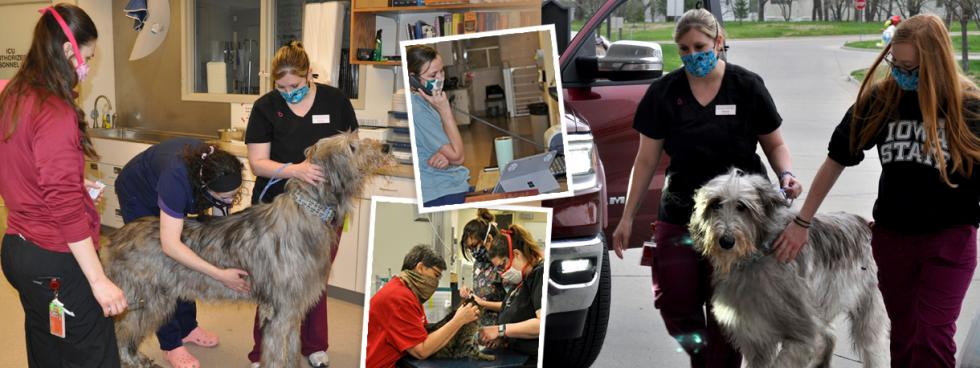
Anything but Routine
Walk into the Hixson-Lied Small Animal Hospital these days and you will notice the differences right away.
Staff are wearing cloth masks. There are no veterinary students working with patients. And there’s not a client in sight.
However, there are still lots and lots of patients.
Since early March when the COVID-19 pandemic hit Iowa, the Hixson-Lied Small Animal Hospital has limited its services to emergencies only. The limitations include a new “curb-side check-in” for all patients.
“An owner calls when they are on their way or arrive at the hospital,” said Dr. Rebecca Walton, clinical assistant professor in the Emergency, Critical and Intensive Care (ECC) Services. “This allows us to ask our standard COVID questions to see if anyone in the household has tested positive or if they have respiratory signs.”
Once the patient arrives, team members from ECC meet the client and patient outside the facility. Patients are then brought inside for triage and evaluation. Any stabilization or life-saving procedures are performed immediately with the owner’s permission.
From that point on, all communication with the owner is done electronically. “A clinician will call the owners to get a history and discuss what we found from our physical evaluation and our recommendations for how to move forward,” said Dr. April Blong, assistant professor of veterinary clinical sciences. “Once diagnostics are concluded or the animal is ready for discharge, our doctors go over the information with the client.” The animal is then brought back outside to the owner along with any prescribed medications and medical records.
The patient care is similar to what was occurring in the Hixson-Lied Small Animal Hospital prior to COVID. The emergency room is open to all emergency cases, although the hospital isn’t doing any preventive care at this time. Walton says the emergencies have ranged greatly.
“We have not only had patients who have been hit by a car, but also abscesses and urinary tract infections,” she said. “Additionally we have access to all of our specialty services if they are needed.
“Not all cases will be evaluated by a specialty service, but if we deem it necessary then these services are available for consultation. The ER is open to all sick or injured cases, it doesn’t have to be life threatening.”
The staff is wearing cloth masks when they interact with the public. And since late March, the clinical rotations have concluded, so no fourth-year veterinary students are available to assist in the ER. That means veterinary technicians from the specialty units have been rotated into the ER. Walton and Blong said the new restrictions were implemented for the health of not only the hospital staff but the health of the clients as well.
April 2020
